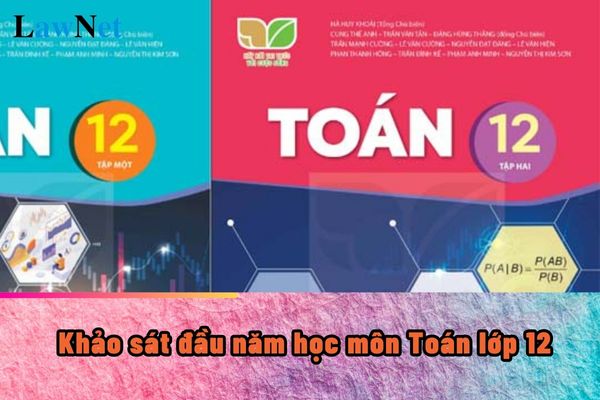Vietnam: What is the Beginning-of-year quality assessment exam?
What is the Beginning-of-year quality assessment exam?
On August 1, 2024, the Ministry of Education and Training issued Decision 2045/QD-BGDDT of 2024 stipulating the Framework for the 2024 - 2025 academic year.
The Ministry of Education and Training stipulates that the earliest schooling shall begin one week before the opening ceremony. For grade 1, the earliest schooling will start two weeks before the opening ceremony.
The opening ceremony for the new school year will be held on September 5, 2024.
Thus, at the beginning of each new school year, some schools will conduct a beginning-of-year quality assessment exam as a basis for developing and implementing plans to improve the education quality tailored to the students in that academic year.
Therefore, the beginning-of-year quality assessment exam is a test to check the students' knowledge at the start of the academic year.

Vietnam: What is the Beginning-of-year quality assessment exam? (Internet image)
What are samples of Beginning-of-year assessment paper for maths subject for grade 9 in Vietnam?
On August 1, 2024, the Ministry of Education and Training of Vietnam issued Decision 2045/QD-BGDDT of 2024 stipulating the Framework for the 2024 - 2025 academic year.
The opening ceremony for the new school year will be held on September 5, 2024.
Students can prepare by reviewing their knowledge and referring to several sample Grade 9 mathematics beginning-of-year assessment tests as follows:
Download Beginning-of-Year Mathematics Assessment Test (Test 1)<<
Download Beginning-of-Year Mathematics Assessment Test (Test 2)<<
Download Beginning-of-Year Mathematics Assessment Test (Test 3)<<
Download Beginning-of-Year Mathematics Assessment Test (Test 4)<<
Download Beginning-of-Year Mathematics Assessment Test (Test 5)<<
Download Beginning-of-Year Mathematics Assessment Test (Test 6)<<
Download Beginning-of-Year Mathematics Assessment Test (Test 7)<<
Download Beginning-of-Year Mathematics Assessment Test (Test 8)<<
Download Beginning-of-Year Mathematics Assessment Test (Test 9)<<
Download Beginning-of-Year Mathematics Assessment Test (Test 10)<<
Download Beginning-of-Year Mathematics Assessment Test (Test 11)<<
Download Beginning-of-Year Mathematics Assessment Test (Test 12)<<
Download Beginning-of-Year Mathematics Assessment Test (Test 13)<<
Download Beginning-of-Year Mathematics Assessment Test (Test 14)<<
Download Beginning-of-Year Mathematics Assessment Test (Test 15)<<
Download Beginning-of-Year Mathematics Assessment Test (Test 16)<<
Download Beginning-of-Year Mathematics Assessment Test (Test 17)<<
Download Beginning-of-Year Mathematics Assessment Test (Test 18)<<
Download Beginning-of-Year Mathematics Assessment Test (Test 19)<<
Download Beginning-of-Year Mathematics Assessment Test (Test 20)<<
How is the Grade 9 (lower secondary school) Mathematics education assessment result evaluated in Vietnam?
Pursuant to Section 7 of the general education curriculum for Mathematics issued with Circular 32/2018/TT-BGDDT, as follows:
- The objective of assessing Mathematics education results is to provide accurate, prompt, valuable information about the development of students' abilities and progress based on the requirements of each grade and educational level;
Adjust teaching activities to ensure the progress of each student and improve the quality of Mathematics education in particular and education quality in general.
- Employ a combination of various assessment methods (process assessment, periodic assessment), multiple assessment methods (observation, documenting activities, oral exams, objective tests, essays, written tests, practice exercises, projects/products, practical tasks, etc.) at appropriate times.
- Process assessment (or continuous assessment) is organized by the subject teacher in combination with the assessment of other subject teachers, self-assessment by the evaluated student, and the evaluation by other students in the group, class, or the parents' assessment.
Process assessment should be integrated with the learning activities of students to avoid separation between teaching and assessment processes, ensuring the evaluation objective of promoting learning progress.
- Periodic assessment (or summative assessment) aims primarily to evaluate the achievement of learning objectives.
Results of periodic and summative assessments are used to certify learning levels and recognize student achievements.
Periodic assessment is organized by the education institutions or through national tests and examinations.
- Periodic assessment also serves to manage teaching quality assurance at educational institutions and to develop the Mathematics curriculum.
- Assess students' capacity through evidence demonstrating the results achieved during their actions.
The assessment process includes basic steps such as: determining the evaluation purpose, identifying necessary evidence, selecting appropriate assessment methods and tools, collecting evidence, interpreting evidence, and providing feedback.
- Emphasize selecting assessment methods and tools that focus on the components of mathematical competence. Specifically:
+ Assess mathematical reasoning and argumentation skills: Can use various assessment methods and tools such as questions (oral, written), exercises, etc., requiring students to present, compare, analyze, aggregate, and systematize knowledge;
Students must apply mathematical knowledge to explain and argue.
+ Evaluate the ability to model mathematically: Select real-life situations that lead to mathematical problems.
From there, students are required to identify the mathematical model (including formulas, equations, tables, graphs, etc.) for the situation in the problem;
Solve the mathematical issues in the established model; express and evaluate the solution in the real-life context and improve the model if the solution is not appropriate.
+ Assess mathematical problem-solving skills: Various methods like asking learners to recognize situations, identify and present the problem to be solved;
Describe and explain the initial information, objectives, and expectations of the situation being considered; collect, select, organize information, and connect it with existing knowledge;
Use questions (requiring spoken or written answers) requiring learners to apply knowledge to solve problems, especially real-life problems; use observation methods (such as checklists according to predefined criteria) to observe learners during problem-solving;
Evaluate through learners' practical products (e.g., products of educational projects); reasonably consider integrated assessment tasks.
+ Assess mathematical communication skills: Can use methods like requiring learners to listen, comprehend, record (summarize), analyze, select, and extract fundamental and central mathematical information in spoken or written texts;
Use mathematical language combined with regular language to present, express, ask questions, discuss, and debate mathematical content, ideas, and solutions in interaction with others.
+ Assess the ability to use tools and means for learning Mathematics: Can use methods requiring learners to recognize the names, functions, usage specifications, maintenance methods, advantages, and limitations of mathematical learning tools;
Present reasonable use of tools and means for learning Mathematics to accomplish learning tasks or to demonstrate reasoning and proofs in Mathematics.
When teachers plan their lessons, they need to establish criteria and assessment methods to ensure that at the end of each lesson, students meet the basic requirements based on the given criteria before moving on to subsequent learning activities.




- What are the sample essays on sharing an experience with a family member for 6th-grade students in Vietnam? What elective subjects do 6th-grade students learn?
- Vietnam: What is Polymer? What is the grade at which the Chemistry curriculum covers Polymer?
- Vietnam: What are the sample social argumentative essays on artificial intelligence? What is the grade at which students initially write social argumentative essays?
- Vietnam: What are the sample discussions on students being late for school? What are the criteria for text corpus used in the 9th-grade Literature curriculum?
- Vietnam: When was the directive on national resistance given? What education level does 9th Grade fall under?
- Vietnam: What is the overview of industrial revolutions over periods in the 10th-grade History curriculum? What knowledge about industrial revolutions do 10th-grade students learn?
- What is the Plan for organizing professional training for English teachers in Ho Chi Minh City about?
- Vietnam: What are the sample outlines of a social argumentative essay on kindness for 9th-grade students? What are the kindness qualities required for 9th-grade students?
- Vietnam: What are the sample argumentative essays on respecting people's differences for 11th-grade students? What are the conditions for 11th-grade students to be eligible for grade advancement?
- Are students pursuing dance in Vietnam eligible for tuition reduction?

